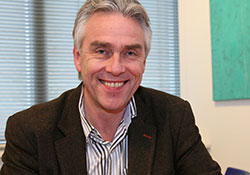Dr Ed Berends runs a health centre in Eindhoven, the Netherlands

"The health centre opened in 1980 in a much smaller building, and my colleagues and I have spent the last 26 years bringing it to where we are now. Our new centre opened two and a half years ago and I am immensely proud of this achievement. Currently we are seven general practitioners, with four practice nurses who undertake cardiovascular risk management and help care for patients with diabetes and lung disease. We also have three physiotherapists, two psychologists and two social workers. It is a great team of people working closely together. Also attached to our centre is a sibling department of dietitians and a pharmacy.
I divide my time half and half, between working as a doctor and managing the health centre, which serves approximately 10 000 patients. It is immensely challenging: combining the administration of activities, which requires a long-term view and planning, with the care of my patients, from which I receive considerable satisfaction and joy. In additional to my medical studies, I took a management training course to run the services we offer more efficiently.
I think the health system in the Netherlands works well, but there is still room for improvement. The government is trying to provide good care, but it is not always affordable. It is not easy to build up or maintain a good system on a small budget. However, it is still possible to provide an efficient service and at the same time emphasize not only cure but also care. Ideally, the system should not be driven by ‘moneymaking thoughts’.
Depression is becoming a big problem in the Netherlands, and detection and treatment are a major issue. The pressures on society lead to more health complaints that are not directly related to a medical condition. The health sector in Eindhoven is giving a 20% score on the depression score list. This does not mean that 20% of the people are depressed, but it does mean that more and more people have feelings of depression. The comparison between major and minor symptoms and successful interventions is very useful. We use this information in our centre with very positive results, which we used to prepare a ‘depression protocol’. We find that pharmaceutical interventions are also very successful.
I think that a more integrated system of care and cure should be built around the elderly. We have taken some initiatives to establish a task force in which all necessary disciplines work together for a yearly goal for every patient. We have started working with all patients over the age of 80 years and, when we have more experience, we shall continue with patients over the age of 70 and possibly, 60. For younger patients we will have a five-year plan, but that is something for the future.
We recently undertook a satisfaction survey among our patients. We were pleased to see that there were no unexpected demands. We have always responded to suggestions and criticism and done our best to improve performance. I am happy to say that our score was above average."


